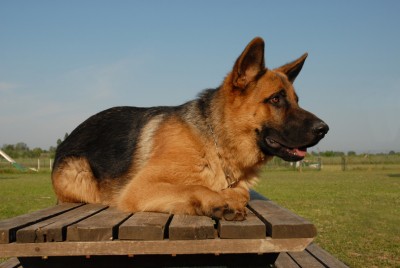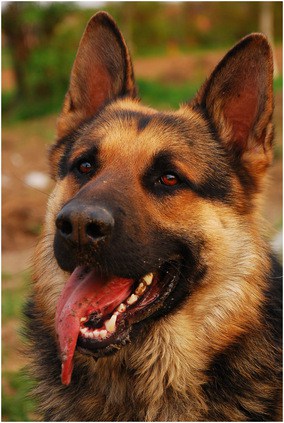The loyal German Shepherd temperament makes this breed a very popular family pet in the United States.
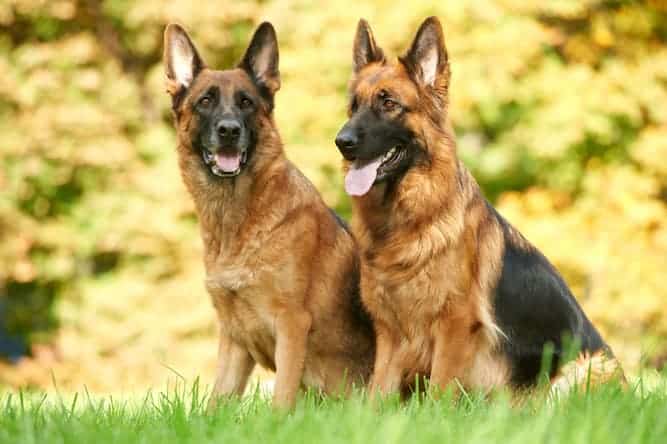
The German Shepherd Dog also called the Alsatian or the GSD, is the 2nd most popular dog breed in the United States according to statistics maintained by the American Kennel Club.
As the name suggests, German Shepherd Dogs originated in Germany where shepherds used them to herd and guard sheep.
If you are considering adding a German Shepherd to your family, take some time to familiarize yourself with the German Shepherd temperament.
German Shepherds do well with experienced owners, but they are not generally recommended for novice dog handlers.
German Shepherd Temperament and Personality
Learning about the GSD temperament is the best way to understand what to expect should you decide to bring home a full grown or puppy German Shepherd.
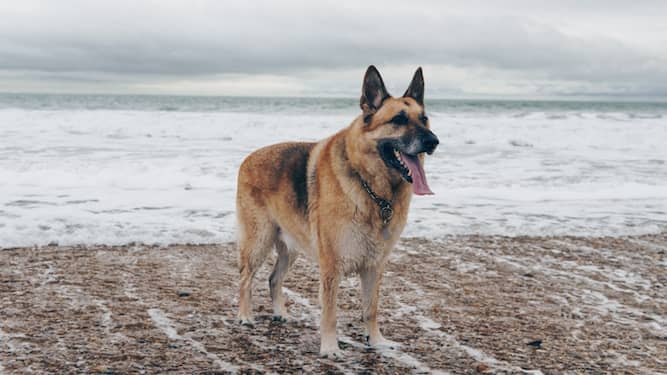
Here are the top temperament traits you should be aware of. Most are positive and some can be problematic if you do not offset these tendencies with proper training and socialization.
Courageous, Fearless and Focused
The German Shepherd is known for its courage. Originally, its job was to defend sheep against wolves … and those genes are still alive and well. German Shepherds make excellent watchdogs. They are also a favorite with the United States military and law enforcement.
It may come as a surprise, but German Shepherds also excel at jobs at the other extreme — for example, as guide dogs for the visually impaired.
Because they have a very well developed sense of smell and tend to stay focused on the task at hand, they are also widely used in search and rescue missions as well as narcotics and explosives detection.
Alert, Intelligent and Trainable
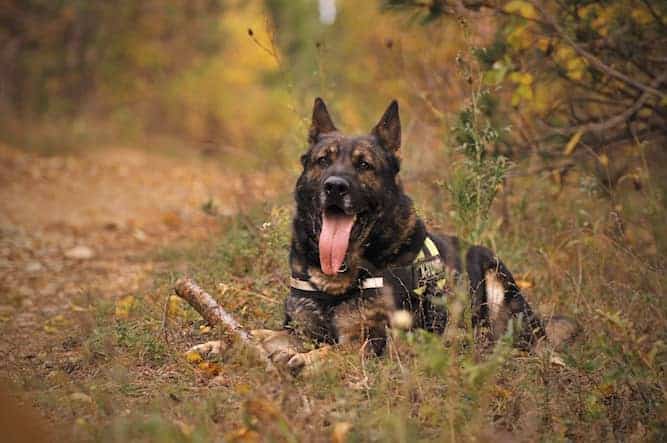
The German Shepherd is a highly intelligent breed. Happily, German Shepherds are very willing to apply their intelligence when being trained. And as a result, you should expect that they will require regular mental stimulation.
There are many options to help keep your GSD mentally active. One of the best ways to keep your dog’s mind engaged is to do daily training sessions. Intelligent breeds such as German Shepherds enjoy learning new things throughout their lives.
You can also prevent boredom with enrichment items such as brain game toys, food puzzles, and Kong toys stuffed with treats.
When you have to leave your German Shepherd home alone, make sure to leave novel toys and puzzles to keep your dog from getting bored or anxious.
If you do not provide enough mental stimulation, your German Shepherd may develop nuisance behaviors such as chewing, barking or digging in the yard.
German Shepherds are sensitive dogs and they can be prone to anxiety-related issues such as separation anxiety.
Exercise, training, and mental enrichment can help reduce anxiety. You can also try products such as calming chews, pheromone plug-ins, and/or a Thundershirt. However, if your dog is displaying extreme anxiety, consult with your veterinarian and a positive reinforcement trainer.
Well-built, Strong and Energetic
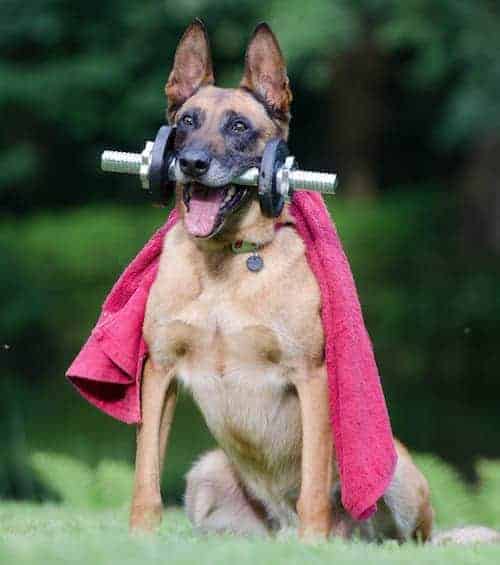
German Shepherds are big dogs. They are athletic and strong, with all the qualities of a great working dog. They usually excel, physically and mentally, when working.
Consequently, if you plan to include one in your family, it is essential that you budget at least one hour a day for physical activity with your GSD.
There are numerous benefits to exercising your dog daily and with this breed daily exercise is more a rule than an exception.
A brisk walk or a run would be ideal; throw in obedience training or other fun activities like swimming into the mix and you should have yourself a stable, happy, pet.
Loyal and Protective
The typical German Shepherd temperament manifests as indifference to strangers coupled with a strong protective instinct of her family.
GSDs are very loyal — particularly to one person in the household. It is therefore vital to socialize your German Shepherd from an early age to prevent this protective instinct from turning into outright aggression.
Without proper socialization and management, a German Shepherd could pose a bite risk to strangers.
Enroll your GSD puppy in a puppy socialization class at the earliest opportunity. Use treats to help your German Shepherd to develop a positive association with strangers.
The German Shepherd Temperament with Children… 7 Tips for Success
With proper socialization, supervision, and management, German Shepherds can be wonderful companions for children. However, it is important to take steps to ensure success.
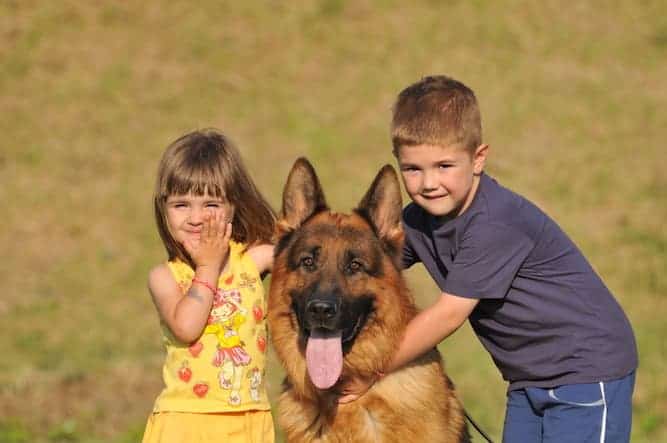
Tip 1:
Never leave any child unsupervised with any breed of dog. Always make sure there is an adult present to monitor the interactions between your German Shepherd and kids.
Tip 2:
Encourage the children to engage in constructive activities with your German Shepherd such as training and accompanying an adult on walks with the dog.
Tip 3:
Do not permit any rough handling or teasing. Do not allow a child to climb or ride on the back of your German Shepherd. Instruct your children how to pet the dog gently. Explain to them that dogs do not like to be hugged or kissed on the face.
Tip 4:
Make sure that they do not interact with the dog when it is eating or chewing on a special toy.
Tip 5:
Reward your German Shepherd for calm, friendly behavior towards children. Use “time-outs” if your German Shepherd gets too wild, jumpy or mouthy in play.
Tip 6:
Do not punish your dog for growling at children. If you scold a dog for growling, the next time he feels threatened, he may resort to biting without warning.
Instead, figure out what is making the dog uncomfortable and make sure to avoid that scenario in the future.
Use desensitization and counter conditioning to make that experience less scary for your dog.
Tip 7:
If your German Shepherd shows aggression towards children, seek help from a professional positive reinforcement trainer right away. However, in most scenarios, the German Shepherd temperament with kids is generally a good match. It is up to you as the owner to set your dog up for success.
The German Shepherd Temperament with Other Dogs and Cats

German Shepherds can generally coexist peacefully with other animals as long as they receive proper introductions, training and management.
Expose your German Shepherd to other animals at a young age.
If your GSD is reactive to other dogs on leash, try socializing him at a doggie daycare.
He will get to socialize with other canines off leash and his interactions will be monitored by professional staff members.
Another great option for socialization is to sign up for a group obedience class. Your GSD will learn how to focus on you even amidst the distraction of other dogs.
Male vs. Female German Shepherd Temperament
Every dog is an individual. There are really no consistent differences between male and female German Shepherd temperaments.
It is more important to get to know the individual dog that you are considering.
Many shelters and breeders conduct temperament tests to get a sense of a dog’s individual temperament.
If you adopt an adult GSD from a rescue group that uses foster homes, your dog’s foster family will be able to give you a very good sense of your dog’s personality.
German Shepherd Obedience Training

German Shepherds are incredibly smart and motivated. This makes them a rewarding breed to train.
German Shepherd training should be fun for you and your dog. Always use force-free, positive reinforcement methods.
Avoid trainers that use “dominance-based” methods training methods.
Never use painful tools such as prong collars, choke chains or shock collars.
Do not use physical tactics such as spanking or “alpha rolls.”
Instead, sign up for a positive reinforcement obedience class. This type of class will help you strengthen your bond with your dog. It is also the most effective method of training.
Helpful Dog Training Resource:
For help with training your Havanese dog take a look at The Online Dog Trainer by Doggy Dan. Doggy Dan is an expert Dog Trainer based in New Zealand. His online resource contains Hundreds of Excellent Dog Training Videos that will take you step-by-step through the process of developing a healthy, happy well-behaved dog.
German Shepherd Grooming
German Shepherds have a thick double coat that requires substantial grooming.
They need daily brushing to keep their coat in excellent health.
German Shepherd shedding is moderate throughout most of the year, but German Shepherds shed profusely once or twice a year during shedding season.
During this time, their undercoat comes out in handfuls. Brushing, bathing, and professional grooming can help keep the shedding under control. However, at the end of the day, these dogs shed a lot, so if you cannot handle dog fur, this is not the breed for you.
The Longhaired German Shepherd is a rare variety in America. It is more common in Europe. The Longhaired German Shepherd requires even more grooming, including frequent trims from a professional groomer.
German Shepherd Health Issues
German Shepherds, like most other purebred animals, suffer from a relatively predictable range of dog ailments.

Elbow and Hip malformations during their growth phase can make a number of them prone to early arthritis and pain. German Shepherd Hip D
They also tend to be more likely than the average dog to have:
- Heart problems,
- Degenerative Myelopathy (similar to Multiple Sclerosis in humans),
- Hemangiosarcoma (a sort of cancer),
- Issues with their eyes
- And Perianal Fistulas (a painful condition of the anus).
Discuss these issues with your veterinarian. If you acquire your German Shepherd from a breeder, ask a lot of questions about the health of your dog’s lineage.
Also, for starters, if you go the breeder route then ensure that you get your pup from a reliable GSD breeder who has used smart breeding practices to limit the probability of many diseases affecting your pup. More on how to prepare and approach GSD Breeders below.
Like all dogs, your German Shepherd should visit the veterinarian at least once per year for an annual checkup and vaccinations.
It is crucial for your German Shepherd to receive heartworm and flea prevention every month without fail.
Spaying and neutering are highly encouraged for health reasons as well as to avoid contributing to the dog overpopulation crisis.
With good care, the German Shepherd lifespan is 7 to 10 years.
Note: if you agree that your health and your dog's health should be a top priority then get a copy of The Ultimate Guide to Dog Health. Your Spitz friend will love you for it. This guide will help save you money, time and most of all help you keep your dog healthy.
German Shepherd Rescue and Adoption
If you would like to add a German Shepherd to your household, please explore rescue options first.
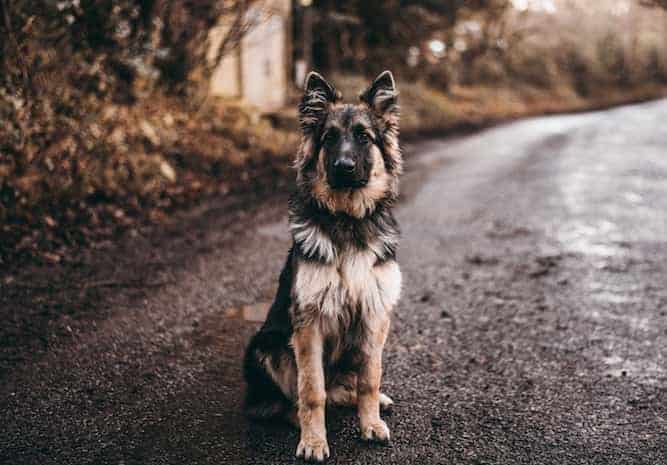
Why Rescue or Adopt A GSD?
German Shepherds are extremely common in American animal shelters.
Most of these GSDs are homeless due to no fault of their own. Many are relinquished to shelters when their owners move or fall upon financial difficulties.
Some owners are forced to surrender their GSDs due to landlord or homeowners insurance restrictions. German Shepherds are frequently on the list of “dangerous breeds” that are prohibited by certain insurance companies and property managers.
Make sure you know the rules and regulations for your residence before you acquire one of these dogs!
With so many German Shepherds needing new homes, please make adoption your first option.
Where To Look?
You can search for local German Shepherd rescue groups on the internet or through Facebook.
You can also use websites such as Petfinder.com, Adoptapet.com, or Getyourpet.com to locate a German Shepherd for adoption in your area.
Visit your local animal shelters and humane societies. Most likely they will have German Shepherds or German Shepherd mixes available for adoption. If not, you can leave an application on file for the future.
It's Much More Affordable To Adopt/Rescue
If you choose to adopt, the German Shepherd cost will probably be between $75 and $200.
Adopted GSDs will usually be spayed/neutered and vetted prior to adoption.
Finding German Shepherd Puppies for Sale
If you decide to work with a German Shepherd breeder, be prepared to do significant research to make sure that you find a reputable breeder.
Unfortunately, many backyard breeders and puppy mills exploit this breed’s popularity to make money.
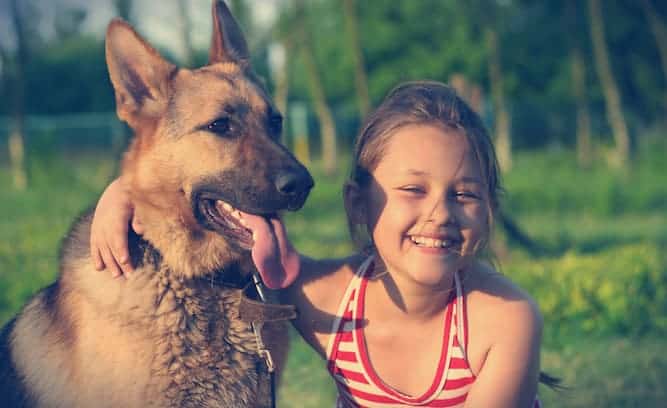
Reputable GSD Breeders – Where To Find Them
A good place to start your search for responsible German Shepherd breeders is the German Shepherd Dog Club of America, Inc.
The German Shepherd Dog Club of America maintains a list of breeders that they feel uphold the tenants of conscientious breeders.
Always Pay Breeders a Visit
Once you identify a possible German Shepherd for sale, make an appointment to meet the dog and meet the breeder in person.
Beware of Unscrupulous Practices
Do not order German Shepherd puppies (or any puppies) over the internet. Do not purchase a German Shepherd puppy from a pet store.
Ethical breeders will not sell their puppies this way.
A good German Shepherd breeder wants to meet you, too. They will ask you questions and show you the dog's medical records. They will ask you to sign a contract promising to spay or neuter your German Shepherd puppy at the appropriate age.
What's the Cost of GSD from Breeders?
If you go through a responsible breeder, the German Shepherd dog price will be between $300 and $900 for a family pet.
Show dogs and working dogs can be over $6,000.
Other Similar Dogs
There are a number of other medium-to-large dogs that are somewhat similar in nature to the German Shepherd.
They do have differences, so if you aren’t quite sure about whether a German Shepherd is the breed of choice for you, consider the following:
A Final Word About the GSD Temperament
The typical German Shepherd temperament makes the dog an attractive addition to any family.
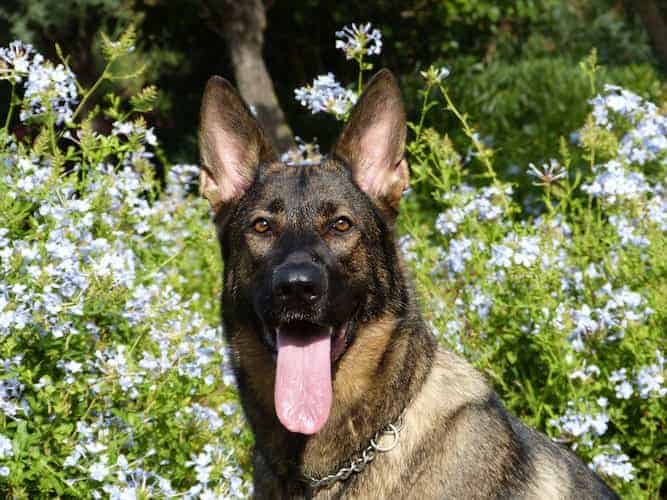
However, full grown German Shepherds weigh in at around 80 to 90 pounds; not only are they big, but they are strong.
It is particularly important that they are well socialized and trained during their early years. Additionally, their intelligence and energy demand an outlet — regular physical activity is a must.
German Shepherds have a life expectancy of about ten years. When well cared for they will provide your family with years of devotion and love.
It is no wonder that they are one of the most popular breeds.
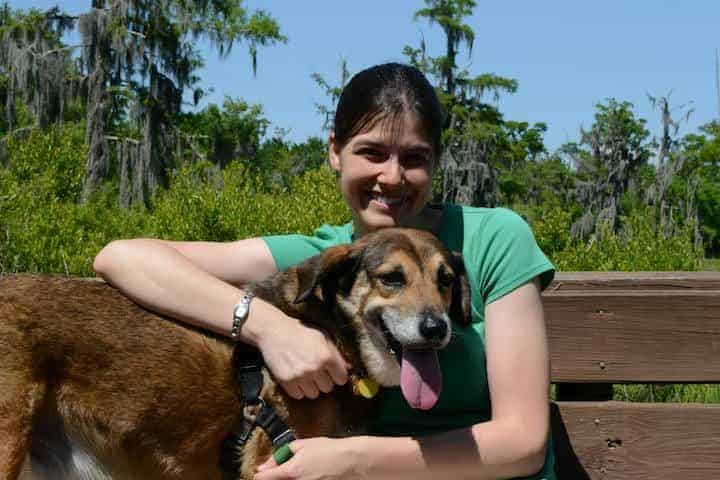
Allie has worked in the field of animal welfare for over ten years and as a freelance writer the space for many years. She has had many different kinds of dogs (and cats) throughout her life—all adopted. She currently shares her home with a lovable pit bull mix named Huckleberry.
